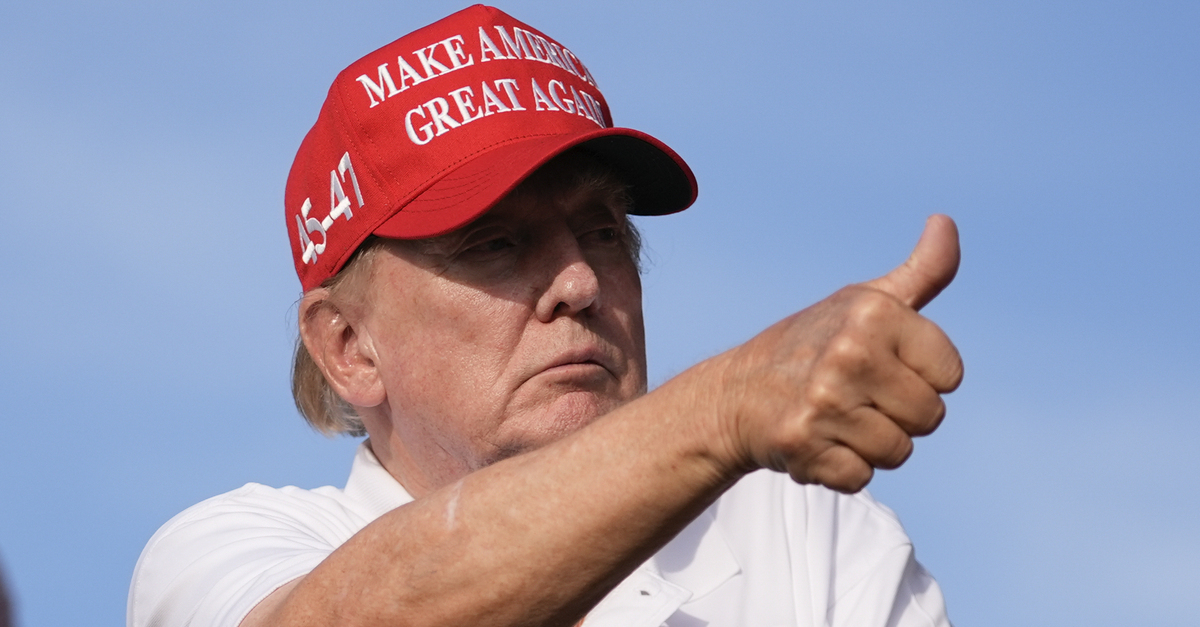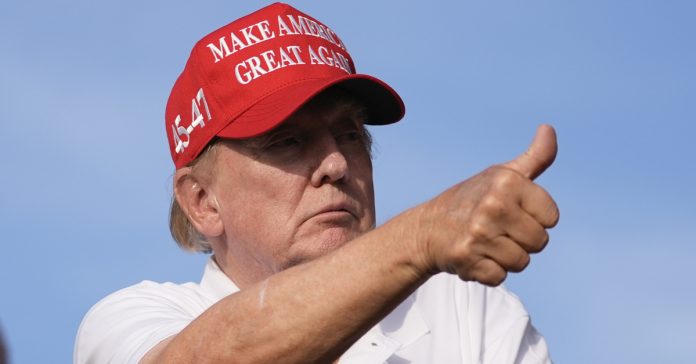
Republican presidential candidate former President Donald Trump gives a thumbs up as he watches play on the 18th hole green during the final round of LIV Golf Miami, at Trump National Doral Golf Club, Sunday, April 7, 2024, in Doral, Fla. (AP Photo/Rebecca Blackwell)
Attorneys representing various branches of the American Civil Liberties Union have weighed in on former President Donald Trump’s last-ditch plea for presidential immunity over his Jan. 6 charges, saying efforts to convince the U.S. Supreme Court to dismiss Trump’s Washington, D.C.-based criminal case should be soundly rejected.
And, the brief argues, democracy itself is at stake.
“In this case, the former President seeks the power to engage in criminal activity and forever evade the accountability that all others must face,” the civil liberties lawyers argue in their 27-page friend of the court filing. “At root, it concerns nothing less than whether the United States is a government of laws in which all citizens, including the President, are subject to the nation’s criminal laws, or one in which the President stands immune from criminal prosecution even for blatantly criminal conduct, and even after leaving office.”
Attorneys Cecillia D. Wang, David D. Cole, and Brett Max Kaufman with the national ACLU, along with Scott Michelman and Arthur B. Spitzer with the ACLU’s branch in the federal district, signed the amicus brief filed with the nation’s highest court on Monday.
In February, Trump asked the nine justices to indefinitely stay the federal case against him filed by special counsel Jack Smith for his defense attorneys to prepare and then file a thorough appeal with the Supreme Court that would eventually lead to oral arguments and a precedent-setting ruling on presidential immunity.
The special counsel, in turn, asked the justices to reject that stay request or, in the alternative, to consider the stay request Trump’s petition for writ of certiorari in order to speed the schedule up a bit.
The court split the difference: putting in place the stay request for Trump and pausing criminal proceedings while giving Smith his alternative request. In subsequent filings, Trump argued he was essentially entitled to absolute immunity from criminal prosecution because Barack Obama “killed U.S. citizens abroad by drone strike without due process” and was not subject to any form of legal consequence. Smith, meanwhile, recently use a different analogy: casting the 45th president as the second coming of Richard Nixon.
The ACLU says the text, history and structure of the U.S. Constitution do not support absolute immunity for ex-presidents.
“The President’s assertion of absolute immunity from criminal prosecution for his official acts — no matter how heinous they are — is not supported by the separation of powers,” the brief argues. “On the contrary, the separation of powers, and the rule of law on which it depends, would be undermined if Presidents were above criminal accountability.”
Trump, by way of his attorneys, has argued former presidents are entitled to sweeping and total immunity — which would place anyone who holds the already-powerful office of the U.S. presidency entirely beyond legal reproach. In filings, the ex-president has also argued sitting presidents “can never be examinable by the courts.”
Such a legal theory, the ACLU argues, would effectively make the president into something not entirely unlike a king. And, as a chapter heading explains, the U.S. president “is a citizen, not a King.”
One historical case is particularly illuminating, the ACLU argues.
“More than 200 years ago, Chief Justice Marshall upheld a subpoena duces tecum to President Jefferson in connection with the prosecution of Aaron Burr,” the brief explains. “Jefferson resisted the subpoena for evidence, but Chief Justice Marshall rejected his argument. Unlike the King, Marshall explained, the President ‘does not stand exempt from the general provisions of the constitution.””
The ACLU says it has long been understood, including by presidents themselves, that they could be held criminally liable for their official acts after leaving office. The brief goes on to cite the Supreme Court’s own ruling where Trump was determined “not immune from a subpoena in connection with a state criminal process” in New York. In briefing before that case was decided, the ACLU notes, Trump himself conceded that state grand juries can investigate a sitting a president “with an eye toward charging him after the completion of his term.”
Additionally, the ACLU argues, examples abound of then-current presidents — including Nixon, Bill Clinton, and Obama — either implicitly or explicitly accepting the view that they could be prosecuted after leaving office. This view, the brief explains, has long been the view of various White House attorneys and the U.S. Department of Justice.
“Former President Trump now asks this Court to depart from this uniform consensus, a consensus view he himself previously asserted in attempting to evade legal process while in office and impeachment after he left,” the ACLU goes on. “He relies instead on ‘a 234-year unbroken tradition of not prosecuting former Presidents for their official acts, despite ample motive and opportunity to do so.’ But the absence of evidence is not evidence of absence. Trump cites no instance in which any official took the position he now advances, namely that Presidents cannot be held criminally liable for crimes they commit as President, even after leaving office.”
Trump, in his own brief, cited a Supreme Court ruling which describes the president acting with his “own discretion,” and for which he is “accountable only to his country in his political character, and to his own conscience.” The ACLU says this quote is taken out of context — and anyway inapposite.
“But not all official acts are discretionary,” the attorneys argue. “And, in particular, the President has no ‘discretion’ to violate criminal law. No one does — that is what it means to have a rule of law.”
A large part of Trump’s argument imports yet another Supreme Court ruling in which the president was, in fact, granted absolute immunity in the civil context — meaning he generally cannot be sued for activities that occurred during the presidency as long as they are official acts.
The ACLU says that argument is a bridge too far.
“[E]xposure to criminal liability calls for a very different balance, both because the risk of harassing suits is significantly diminished, and because society’s interest in enforcement of criminal prohibitions is generally greater,” the brief argues.
The ACLU goes on to argue that the allegations against Trump are particularly troubling and need to be resolved in a criminal court because they “strike at the heart of one of the most essential hallmarks of democracy: the peaceful transition of power.” And, if Trump’s argument holds the day, it would “allow future Presidents to abuse their office to resist the transition of power,” the brief argues.
Here, the ACLU says, the damage would be immense.
“On the former President’s view, even if he had personally conspired with a circle of his supporters to assassinate the Vice President and hold Congress hostage in order to remain in power, he would be immune from criminal prosecution thereafter,” the brief concludes. “The very audacity of the claim reveals its central flaw — it would for all practical purposes allow a rogue President to seek to transform a government of laws into a fiefdom for himself, and to avoid all criminal accountability thereafter for doing so. That proposition cannot be squared with the most fundamental premises of a constitutional democracy, and must be rejected.”
Have a tip we should know? [email protected]

